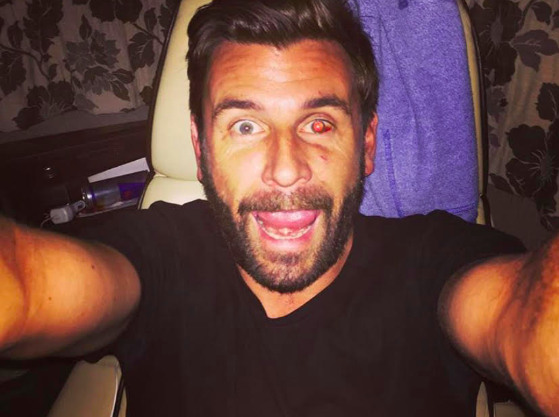“An eye for an eye makes the whole world blind.” ~ (maybe) Gandhi
The first and last time I met James was when he punched me in the eye.
It was the summer of 2015 when the unexpected sucker-punch landed like a sledgehammer to my face, immediately shutting down my left eye and fracturing my orbital socket.
The damage from the punch turned out to be rather severe, as the impact had crushed the front of my eyeball, mis-shaping the iris, and thus dislocating the lens, which no longer sat snugly inside what should’ve been a perfectly circular pupillary sphincter.
About a year and a half after the assault, my lens sort of “fell” from the cosy home it had occupied for 42 years, moving into the less familiar neighbourhood known as the middle of my eyeball. So in early 2018, I found myself with a cataract, and in the unenviable position of needing two surgeries: one to fish out the lens, the second to implant an artificial lens over the iris (just under the cornea).
Sadly, a few months after the second operation, the lens became dislodged and now chafes against my iris, causing acute and rather phenomenal pain inside my eyeball every time I blink. I need another surgery, which will once again leave me aphakic (without a lens at all); and I haven’t yet decided what to do from there.
James was an angry man. I had recently begun seeing (pardon the sh*t pun) his ex-girlfriend, which apparently hadn’t gone down all that well with him. He’d sought me out at my local bar, apparently to exact revenge and to somehow alleviate the pain of his recent loss. That he did.
I later learned that the real reasons behind his pain related to some raw family tragedy. Aside from being wildly inappropriate, discussing such things in this story would show a lack of compassion, which he very much deserves.
James was arrested and charged with my grievous assault and was eventually found guilty. He was sentenced to two years with a suspended sentence, and he never saw the inside of a cell, walking away scot-free.
I had been a serial womaniser back in those days—and for a long time prior. My friend Ian commented that I had gotten what was coming to me. He was surprised that James’ punch had been the first, and I certainly couldn’t help but consider the karma brought to me by the event.
If I can’t forgive, then how am I healing?
Revenge, spite, damage, pain, suffering. On one level or other, these words will resonate. With a vice-like grip not dissimilar to that of Dwayne Johnson, these emotions can drag us kicking and screaming up memory lane any time the mind wishes. Just like that, we hold onto past traumas where we played victim to another’s thoughtless or deliberate actions.
Some of us are able to forgive, whilst others are unwilling or apparently incapable. We say things like, “I can never forgive this,” or “I will never heal from that.” We convince ourselves that our trauma will stay with us forever, and defiantly ask, “Why should I forgive them anyway?!” Fueled by anger, resentment, and fear, I used to think the same way. My suffering was part of my story.
In fact, it’s common for us to declare that we can never be at peace because of a past event that caused us pain. Of course, such declarations to oneself are a form of self-programming, which results in us believing these thoughts. They are our thoughts after all.
Notwithstanding that, part of the human condition is to hold onto suffering, regardless of the unarguably negative ramifications.
There are those of us who are adamant that we understand these ramifications, yet we are still unwilling to forgive. Why? “Because he/she does not deserve my forgiveness!” It’s in this sweet spot of woe that I’m keen to with this particular article. Because here’s the thing: they probably couldn’t care less whether you’ve forgiven them or not. In fact, the more heinous the trauma, the more thoughtless and less interested the persecutor is likely to be.
No shaming, no judging: this is not a story designed to shame those who refuse to forgive. It’s a story about how giving up suffering changed my life forever.
“To create suffering without realising it is the essence of unconscious living and the extent of the ego…” ~ Eckhart Tolle
Why do we hold onto suffering?
Eckhart Tolle speaks at length on the subject of ego-created identity—how our ego creates stories to convince us we cannot be at peace now.
As the good Mr. Tolle also muses: hanging onto emotion strengthens our identity — and either consciously or subconsciously , we become suffering, as the emotional pain we carry develops as an intrinsic part of us. It’s part of our story.
The thing is: we all have fair claim as to why we can’t be at peace now (or in the future). We’ve all experienced trauma and we all have an inherent ability to create an associated maelstrom of chaos within ourselves. We can all replay stories of woe, worry, or unhappiness in our minds — either from the past, or from a future that hasn’t even happened , and may never happen. Jeez…exhausting, isn’t it?
I know from firsthand experience that this way of thinking brings everything but peace.
“The ego doesn’t know that your only opportunity for being at peace is now. Or maybe it does, and it’s afraid you’ll find out. Peace, after all, is the end of the ego.” ~ Eckhart Tolle
How I learned to forgive.
Revenge and resentment are commonplace of course —and I was no different. For a long time, anger twisted a knife inside my gut, whilst my broken mind replayed the situation over and over again. I constantly fantasised about exacting revenge on my assailant — even of blinding or maiming him. Toxic thought after toxic thought turned around inside me like a bile-filled washing machine. I also wanted everyone to know about it—to re-tell my story of woe, and to gain attention and sympathy from my audience. Perhaps I felt that sympathy from others would somehow alleviate my suffering. It’s safe to say, however, that this way of thinking was in fact making me ill.
It came down to a simple case of protecting my mental health. I had reached the point where my negative thoughts relating to my assault were doing as much for my poor health as the injury itself.
Eventually, I could stand these thoughts no longer and realised I had to properly process this trauma. To take whatever lessons there were to learn, then let go of the rest. Whilst the burden was indeed heavy, the only person affected by these thoughts was me. Actually, that’s not true. I also hurt those close to me as they took the brunt of my suffering and of the associated bitterness, though I could never admit it back then.
When using the word “forgiveness,” we often forget its true definition. (Clue: it’s not about them.) “Forgive: To stop feeling angry with someone who has done something to harm, annoy, or upset you; to stop feeling angry with yourself; forgive somebody/yourself (for something/for doing something).”
When I finally learned the power of forgiveness, the words in the definition suddenly reached out and hit me (thankfully not in my bad eye). I suddenly understood that holding on is all about how we choose to feel about an event. To forgive is to stop feeling anger; stop feeling upset; stop feeling annoyance. It really has nothing to do with the other person.
Understanding this lesson was the key to me finding happiness. By learning to make peace with the present moment (solely focusing on now), I changed the way I felt by learning to switch off my “monkey mind.” To me, this is the true meaning of letting go.
I asked myself, “How can I forgive?” whilst considering how to put down the heavy burden of emotion that I attached to my memories.
In this newfound space, I saw that the past could not hurt me—only the thoughts with which I tortured myself. With this in mind, I saw that in listening to my futile thoughts about a past event, I was literally hurting myself.
So I learned to tackle this dark passenger simply by becoming aware. Aware of my sadness, my thoughts, and my feelings. Furthermore, I became aware that my thoughts actually belong to my ego (my mind), and I am not my mind. My thoughts are not the essence of me.
In having this pure awareness and presence, I was able to strap my monkey mind firmly in the back seat, stuff a dummy in its mouth, and take charge of the wheel.
Someone far wiser than me once said: “Yesterday is heavy. Put it down.” So I did! When you realise that the alternatives are pain, suffering, a restricted flow of life energy, and in many cases physical disease — why would you do anything else?
Forgive me for saying this, but anyone who tells you that holding onto their suffering is not having a negative affect on their lives is simply not being honest with you — or themselves. Making this admission is the first step. I’m not saying it’s easy, mind you.
Just like all mindfulness issues, this begins with inner acceptance, with inner work. It’s hard work that no one else will make you do. It’s for you to do alone. After all, it wouldn’t be called a “hero’s journey” if it was a walk in the park, would it? Perhaps learning to forgive makes us the heroes of our own story? I don’t know. One thing I know for sure is that it allowed me to rewrite mine, making me happier and healthier in the process.
A fistful of forgiveness quotes:
Still not convinced? Here are five quotes on forgiveness, from people far cooler than me:
- “Forgiveness doesn’t excuse their behaviour. It prevents their behaviour from destroying your heart.” ~ Hemant Smarty
- “Forgive them for they know not what they do.” ~ Jesus Christ
- “The moment you truly forgive, you have reclaimed your power from the mind.” ~ Eckhart Tolle
- “Forgiveness is not forgetting or walking away from accountability or condoning a hurtful act; it’s the process of taking back and healing our lives so we can truly live.” ~ Brené Brown
- “Just because you lost me as a friend, doesn’t mean you gained me as an enemy. I’m bigger than that, I still wanna see you eat, just not at my table.” ~ Tupac


 Share on bsky
Share on bsky





Read 10 comments and reply